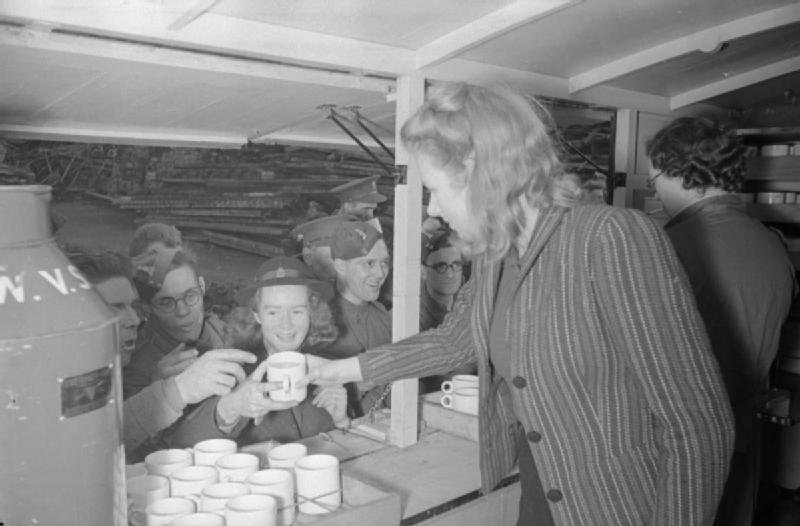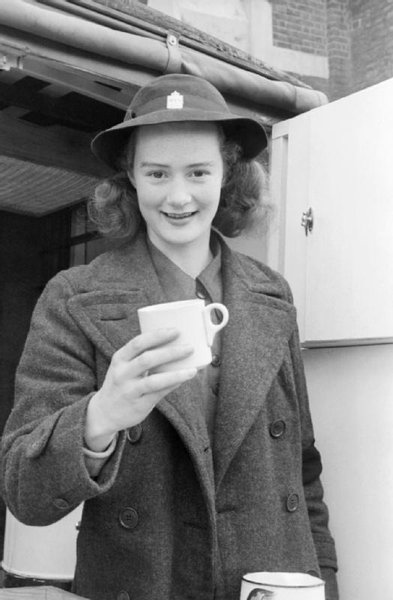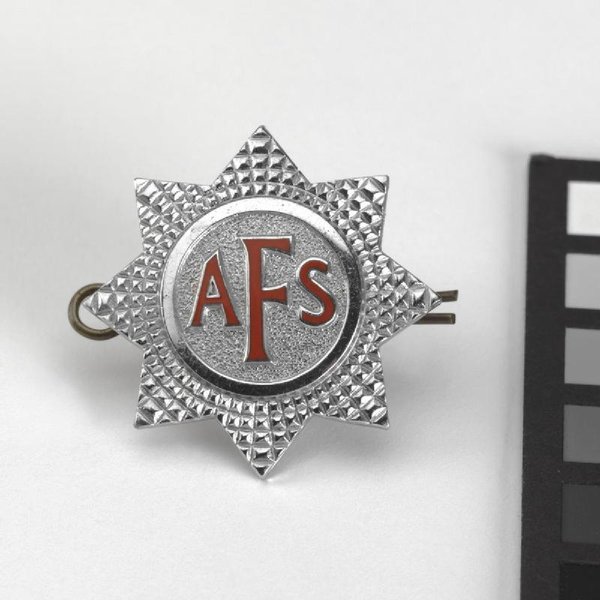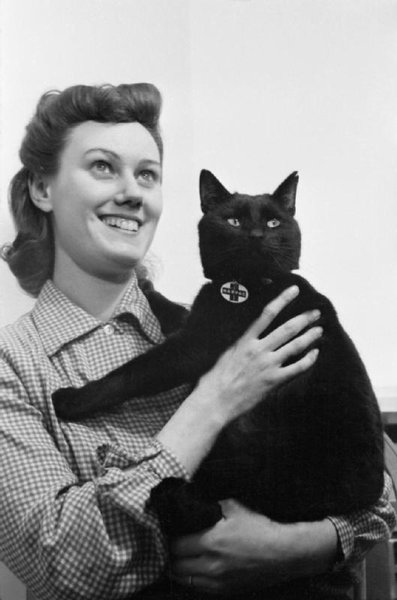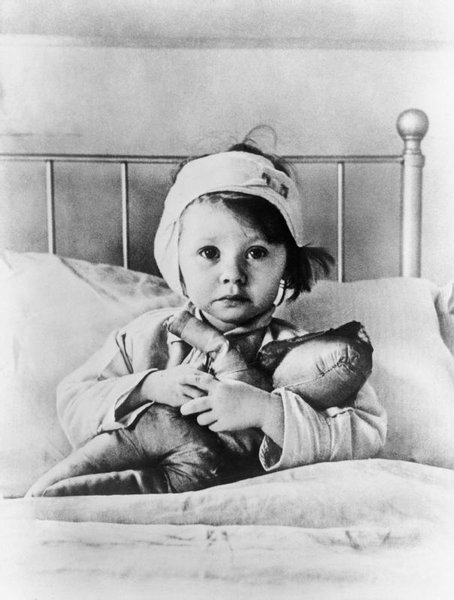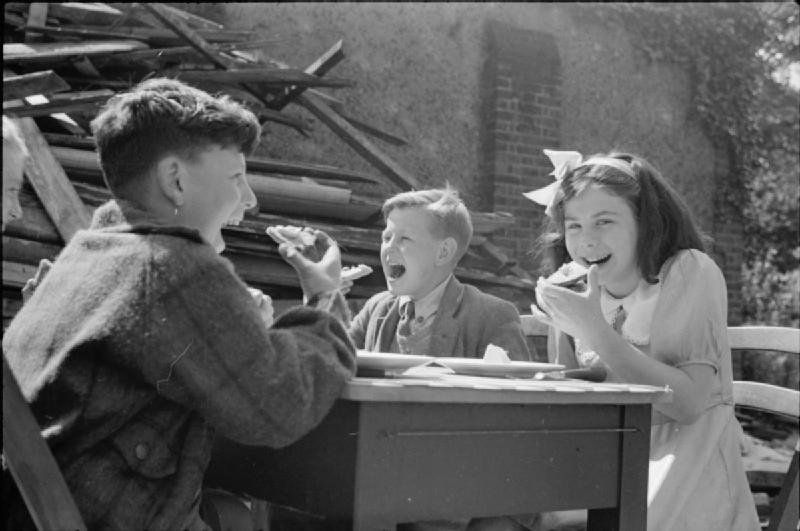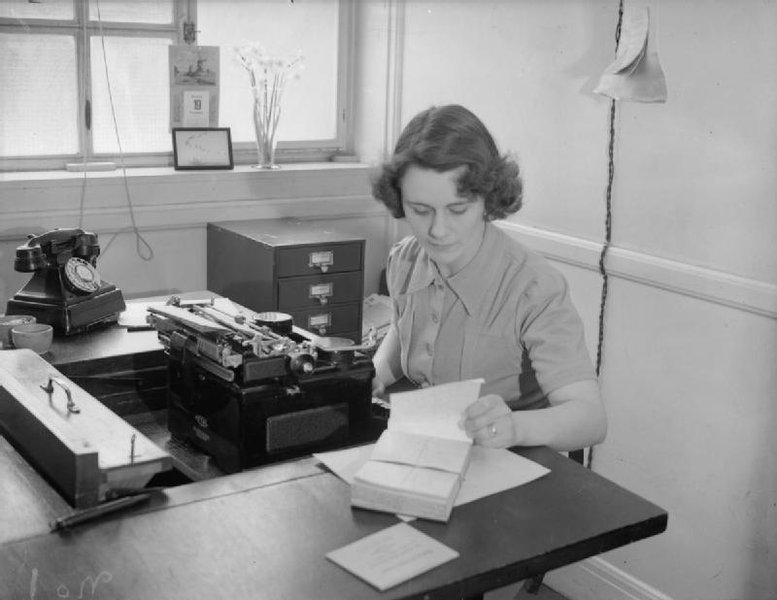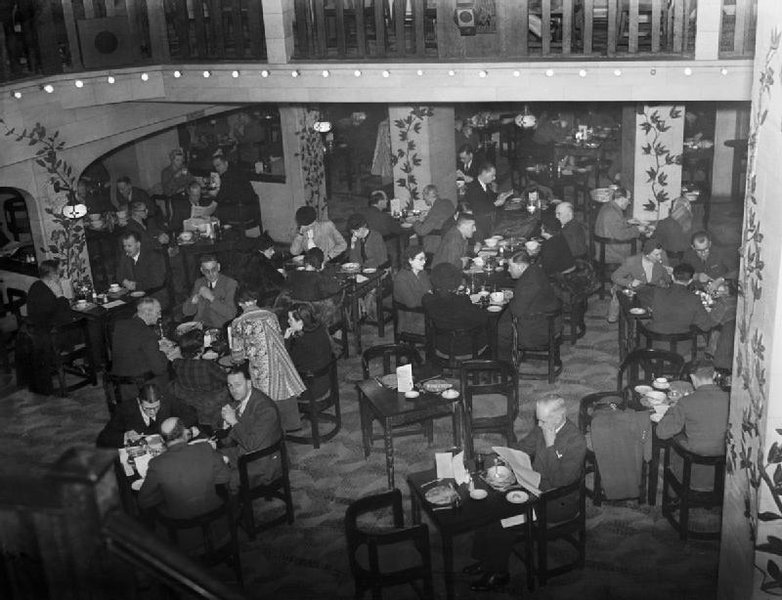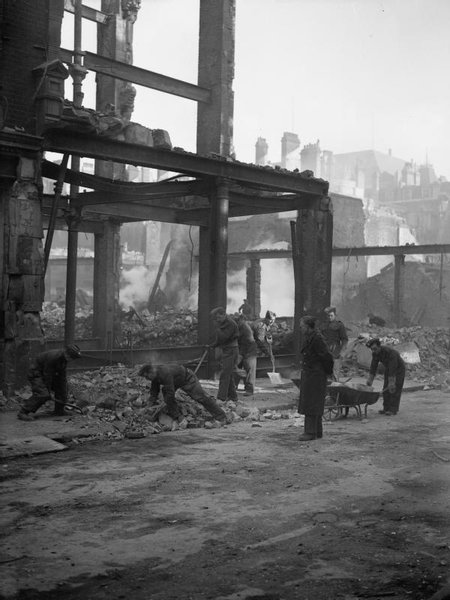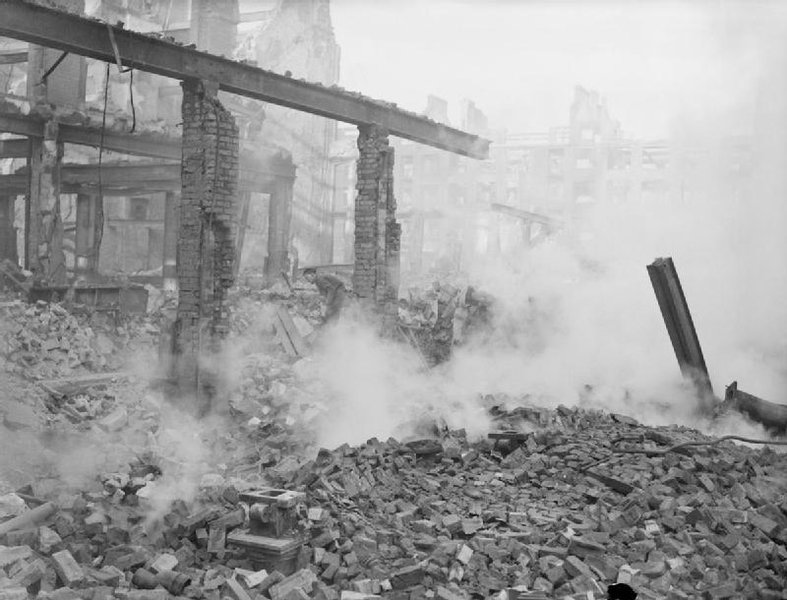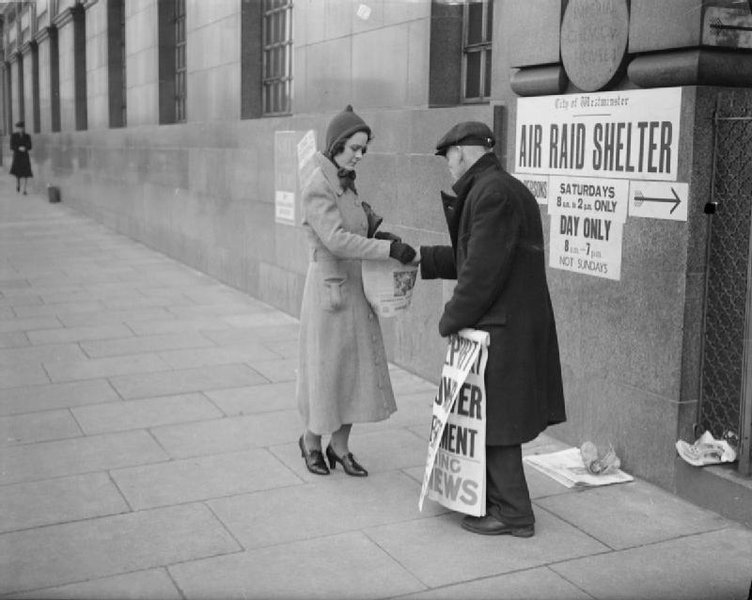High Explosive Bomb at Colebrooke Row
Description
High Explosive Bomb :
Source: Aggregate Night Time Bomb Census 7th October 1940 to 6 June 1941
Fell between Oct. 7, 1940 and June 6, 1941
Present-day address
Colebrooke Row, Islington, London Borough of Islington, N1 8DE, London
Further details
56 20 SE - comment:
Nearby Memories
Read people's stories relating to this area:
Contributed originally by BBC LONDON CSV ACTION DESK (BBC WW2 People's War)
"I'm a cockney born in Kingsbury Road near the Ball's Pond Road in the East End in 1937, so I was like 4, 5 and 6 when all this happened. I went to a Catholic School and during the Blitz when the air-raid sirens went, we'd get under the table and our teacher would say 'now you've got to pray' so we all prayed until the all-clear went.
One morning at 3, my mum's sister cam in and said 'there's a big bomb dropped near the old lady's house - that's what we called my gran - but she said she's all right. We rushed down the road and saw that a bomb had dropped on a school. I'll never forget, there wasn't a window left in none of the houses around. We went into a schoolhouse, the door was wide open, and there was blind man upstairs which they got our early; the whole ceiling had come down on him. We went into the kitchen and there was only about three bits of plaster left. The plaster round the rose on the ceiling was about the only bit left. I asked the blind man if he was okay and he said 'yeah' so I made him a cup of tea. We was lucky because if that bomb had dropped at three o'clock in the afternoon it would have killed all the kids.
I'll never forget this, the front door swung open and a fireman stood there. He said 'Everyone all right?' and one of the women said, well, I can't say what she said, but to the effect of 'that xxxxx Hitler can't kill me!'
We lived off the Ridley Road at the time and during one of the air raids one night, everyone went down the shelters and my dad said to me "Want to watch the airplanes?' My mum said 'That's not a good idea', anyway, he put me on his shoulders and we stood in the doorway and watched the dog-fights overhead. And I tell you, when them German planes got caught in the headlights, they had a hell of a job to get out. Anyway, the morning after these raids, all us kids'd go out collecting shrapnel from the shells, I had a great big box of the stuff.
Was I scared? Only when I was in bed at night and the air-raid warning went. When you're asleep and you suddenly woke, you didn’t' know what was happening so it was pretty frightening. At that age, you didn't know what air raids were all about. Some of the time I slept in the cupboard under the stairs and it felt a bit safer there.
One day, I went round to the corner to my aunt's house and she was sitting by the window when there was an air-raid warning. Inside the window where she was sitting was a table with a statue on it. They told her to come in away from the window. I'll never forget this, there was a bomb blast, the window come in and the statue toppled off the table and onto the floor. If she hadn't have moved, she'd have been covered with flying glass.
My dad didn't go in the army, because he was wanted on the railways. He took me down the dog racing one day at Hackney Wick. This flying bomb - a doodle-bug it was - suddenly appeared over us. You could see every detail of it. We all ran. It went right across the track and dropped in a field somewhere.
One day a landmine dropped near us in Kingsbury Road and didn't go off. A fellow came down from the Bomb Disposal unit, to try to disconnect it and he got killed. Opposite us there was a block of flats and they named it after him - Ketteridge Court.
I was evacuated for a little time, to Kettering, but I don't remember much about it, only that I didn't like it. I'd have to ask my mum about it. She's 100 but still remembers everything.
Me and my family are Pearly Kings and Queens and we do a lot of charity work, entertaining with music and the old cockney songs and that (Phone 020 8556 5971). We are now the biggest 'Pearly' family, made up mostly of the Hitchins (my mum's family name) in Hoxton, Tower Hamlets, Hackney, Clapton, Shoredich, Hommerton, Dalston, City of London, Westminster, Victoria, Islington and Stoke Newington. "
Contributed originally by Herts Libraries (BBC WW2 People's War)
Hello. My name is Alan French, and today is the 14th October 2004. The anniversary of the battle of Hastings. Well firstly I can’t remember a lot about World War Two, because I was wearing napkins at the time. My war time experiences were spent in Abbot’s Langley and Holloway.(Not the famous part, but the region in London.)I have got a feint memory of my father being close to my face going, 'Shhh! Shhh!' and hearing some bangs in the background, which I think could have been bombs. I can also remember some blue curtains behind him. I’ve been told there was a situation where I was having a tin bath, because in those days we didn’t have bathrooms, unless you were terribly posh or very lucky. There was an explosion somewhere, and my father grabbed me out of the bath. When he looked, there were all bits of glass that had shattered in the water. So I was very lucky. Very lucky indeed. My mother had a sister, Mary. She also had a brother, George Beales. Her sister married into a family called Bishop, elsewhere in North London. The Bishops moved to Abbots Langley in the late 1930s. During the war, for a few months, my mother and I, stayed with them, in Breakspear Road. So that is why I hovered between Holloway, where I lived, and Abbots Langley during this conflict. Tom and Mary Bishop, with my cousins, had two dogs. Bob and Toby. Bob, I have been told would guard my pram. He would not let people near me. (Although, of course it could be that he was comfortable and did not wish to be interupted.)It was during my stay in Abbots Langley, that one of my older cousins, whilst in the army at the time, was married. Although some of my earliest recollections, probably took place in the war they are not all war related. One thing I can remember very distinctly, and it’s something that I’ve seen even in adult life, is that you didn’t have to go far without seeing a bomb site. I mean, quite close to me, there was a whole school that had been blown up. Things like that were common place. It was also quite common in the street, for some years, to see people who were unfortunate to have limbs, or an eye, missing. I understand that I was born during an air raid. When, a few months later, I was taken to Abbots Langley, I gather there were nasty things coming down from the sky and exploding upon landing. I was just rushed into the van, car, lorry or whatever vehicle, and whisked off. So I consider myself to be very lucky to be alive. There are many who are not. And of course there are stories you hear from your parents, and there are some you don’t hear. When I sit back and think, I don’t really know much about the nitty-gritty details of what my father did and whether he saw things that he didn’t want to talk about. He wanted to join the Royal Air Force. He went up to enlist, and I gather they said, “You’re missing”.
Apparently someone with the same name was missing from duty. He worked for a leather firm in Somers Town, which is in another part of London which comes under St Pancras. If you think about it, leather was a very valuable commodity. Soldiers used/needed it for boots, straps for rifles etc. So he was required to do some work in this field. At least one lady gave my mother bitter comments due to my father not being at the front. My mother worked for a firm called Cossor's who manufactured wireless sets, as they were called then, radio today, also radar equipment. She did say that there was this bomb or rocket or something,that severely damaged the factory leaving this huge awsome crater. The firm was based at Highbury Corner. We lived in a road called Madras Place, which is a turning sandwiched in between, Liverpool Road and Holloway Road. Appropriately one entrance is opposite the Islington Library, so perhaps I should be recording this interview there.My parents became fire watchers. I cannot find it at the moment but I know I’ve got a Fire Watchers Handbook and other hand books, Battle of Britain, What to do if Hitler Invades, and if I come across them I will come down here some day and say, 'Look what I’ve got!' I have some memorabilia here, including a letter from the desert which I will read out later, because its very difficult to transpose. (See Part two.) I’ve got a photograph of me at some celebration. I don’t know whether its 1945 or 1946. Because there were a lot of Victory parties in 1946 as well.
Q. Do you know which one you are?
A. That’s me and the lady on the end is my mother, only just in sight. The only other person I know there, is a little girl, in the front row, called Wendy, who used to live next door. There’s another little girl I played with called Denise, who also lived nearby. But I do not think she is in the photo. I don’t know where it was taken. I think it was organized by some Canadians. I was forbidden to go to one victory party. Apparently I was too young. Babies not allowed. My mother wasn’t very happy. I didn’t know this until I was well into my adulthood. In compensation, the organiser gave my mother a toy for me. She explained that I never had it. She said, ‘Well it was one of these things you sometimes get in Christmas crackers made of metal, you press it and it clicks. I thought it was very dangerous for a baby, and what's more it was made in Japan!'
Remember, the Japanese part of the conflict, ended, for the first time ever, in nuclear warfare. Nazi Germany was also on the verge of an atom bomb. See the film, 'The Heroes of Telemark.' So World War 2 was in some ways a nuclear war.
Q. It must have been very difficult for your mum and dad to have had such a small baby.
A. Yes.From what I gather, they used to live in Westbourne Road, which is in the Barnsbury part of Islington. I think they were a little worried because they were living upstairs somewhere, and with bombs coming down, if anything happened... So they moved to Madras Place, in Islington's Holloway region. We lived downstairs. We had at least one bedroom, a kitchen, a living room and a front room. There were other people who lived above us. There was Mr & Mrs Horton. Above them, at the top, there was a man I called 'Uncle' Jack. There was a lady who lived with him for a while. I am not sure in what way she was related to him. Before he moved in, there was a Mrs Bennett who died. I can remember quite clearly other neighbours. I have already referred to Wendy, who together with her brother Trevor,lived next door with their parents, Ted and Doris. On the other side of my house,there was a family called Biggs, Mr. & Mrs. Wheeler and another lady called Alice, all living above or below one and other. Mr and Mrs Biggs, had a son who was in the Navy. Thanks to him, I had my first banana. He got it from Gibraltar. There might have been a daughter called Babs. I can remember elsewhere in the street, a family called Rowbottom. The block of flats at the junction of Liverpool Road and Madras Place, I can remember being built. I can't remember what was before them. Denise, to whom I have referred earlier, lived at the end of Ringcroft Street. One of two roads that entered Madras Place from its side. I can't remember her father's name, but her mother's name was Grace. There are stories I have heard. I don’t know whether or not I should tell them on the air, because they may not be for the squeamish, so If I do tell , there will have to be some toning down. There are some nasty stories and some very comical ones. Do you want to hear the serious ones first?
Yes, tell the serious ones.
OK, I’ll try and tone down the first one because it’s not very pleasant. I gather a bomb or rocket came down and exploded. A pub's bar room floor collapsed with people on it, into the cellar. Unfortunately, there were spirits in the cellar. They ignited. There was a huge mass panic to get people out. I’ve toned that story down considerably. Another tragic one, is where a rocket came down on a house and a woman, who incredibly, had thirteen children, happened to be out at the time. All thirteen children were killed. Just like that. I have been informed by someone, who claims that he went into the building afterwards. There was nothing that could be done. It was a terrible sight. The children were just all huddled there. All that could be done,was just get their bodies out. There was nothing else you could do. I have also heard of a woman's husband being absoloutely riddled with bullets. So there were some tragedies. But I’ve also heard that sometimes, there were were things that could make you laugh. There’s the situation of a Costermonger, (Costers as they were also called as well as barrow boys) named Billy Hutchings, who when I knew him had a stall on the Holloway Road Pavement Market, as did one of my grandmothers, Lucy Offer. (Offer, by her second marriage.) Unfortunately, whilst he was taking his bath, (A tin one) a rocket came over Islington and split in half. One half just went into a roof without exploding. I don’t know if it was his house or a house nearby. Inevitably, something came down the chimney - soot, dust etc all over him. There is a story I can tell of a similar experience someone had when I moved to Hemel Hempstead but it has nothing to do with the war.
End of Part One.
The second half includes the reading of a letter from Tunisia as well as a continuation of this interview.
By the same contributor:-
'The Three English Brothers French.'
'The White Figure.' (A true wartime ghost story.)
Contributed originally by Pam Cuthbert (BBC WW2 People's War)
When the second war was declared, I was fifteen years old. I worked at the Admiralty in Westminster as indoor messenger, carrying files etc. from office to office. Although I was not in the forces, I think I can claim I had an exciting war. When war came, our duties were changed to twenty-four hours watch, twelve on duty and twelve off. Alternate day and night duty. Like sailors on ship, eight am until eight pm and the next day, eight pm till eight am.
My duties sometimes took me to the small telephone exchange in the building. I was fascinated with it, and wanted to be a telephonist. I asked one the men how I could be. He told me I had to be sixteen, and apply to the GPO.
The first year of my working life, I gave mother all my weekly wages, 10 shillings. She gave me back one shilling pocket money, paid my bus/tram fares, fed me and bought my clothes. The second year I had two and sixpence pocket money, but had to buy my own stockings! I was now earning 13 shillings a week. How much that bought I can't remember. I had to buy a snack in the canteen mid-session, but it was cheap. I think I mainly bought soup with a scoop of mashed potatoes in it. Tea and coffee as well in the breaks.
One night, the first of the London air raids, I left work at eight pm, got the tram to come to my home at Peckham. I was on the top of the tram alone. The noise of the bombs was frightening. In front of me I could see the sky red from the fires, possibly Surrey Docks. The nearer I came to home, I was afraid that I would find no home left. The conductor when I got off the tram, told me to keep on the road, in case of falling buildings. Home was about ten minutes walk from the stop. Bombers were above me and I took to my heels and ran. The road had recently been tarred and gravelled. I fell, scraping my skins and knees, ruined a new pair of stockings! (Clothes coupons were needed for them!)
I reached the house and made for the air raid shelter. No one was there. I waited until the bombers had gone and went to the gate in the fence between our garden and the neighbours. Mum and Dad were there in their shelter. They wouldn't call to me because of the bombers. They reckoned I would get to my shelter quicker than the other. Ron, my brother, had been evacuated. Imagine, a fifteen-year-old, naive girl in this situation!
I honestly think this was the first and last time I was scared all through the war and other events I had to face over the years. Like the time when we had incendiary bombs in the front and back gardens, I upended a heavy pot with a grapefruit plant in over one threatening to set the fence afire. I had grown it from a pip, was very proud of it. We had been warned not throw water on them, as they might explode.
The times the buzz bombs cut their engines overhead. You knew they were going to fall then. Once I came home from night duty to find my street cordoned off. The warder wouldn't let me go, until my mother came to the gate and waved to me. There was an unexploded bomb in the street.
All through the war years we had bowls and buckets in the top floor of the three story house. We had loose tiles on the roof which let the rain in.
At first when I came home from night duty, I would go to bed. If there was a raid, mum would wake me, I would go to the shelter with her. But I couldn't get back to sleep again, so I stopped her waking me, saying I would take my chance, I was exhausted from lack of sleep. The fact was, we were so used to the bombs and fires, we began to believe that was the norm. If we had a night free from raids, that was not normal!
At sixteen, I wrote to the GPO to apply for a job as telephonist, and was accepted. The first day I had to go to Old Street for training. At the weekend there had been bad air raids, especially the east end of London. I was climbing over the firemen's hoses etc. All the time I was there, the bombs were falling. It was very noisy. After a week I was sent to Faraday House, a few yards from St. Paul's cathedral. A much bombed area.
In those days it was the Trunk exchange. Callers had to dial trunks for calls outside London. It was very busy. When the training was finished I was put on the duty rota. The shifts were very funny times. One lasting for two weeks, we called up and down duty. From seven am to twelve noon, one day, the next day, twelve noon until seven pm. which meant in the winter I was going home in the dark and every other day, arrived in the dark. Eventually they built bedrooms with bunk beds in the basement. When we came off duty at seven pm we stayed there. There was also a common room and a canteen. The latter was on the seventh floor - the top floor of the building. The exchange was built on six floors, two switch-rooms to a floor. I worked on the third floor. One day, a buzz bomb cut the engines, we all stopped speaking, you could have heard a pin drop in the silence. A supervisor called out, "Get on with your work!" So, we did. Hard times!
One night when we were sleeping in the bunks, we were woken and told to dress and go to the common room. There was unexploded bomb in the courtyard between the four walls of the building. A friend and I decided to go back to sleep, fully dressed.
In the canteen there was no water, electricity or gas. For breakfast, we had a glass of milk, and bread and margarine, also marmalade. When we got to the switch-rooms, there were candles on the top of the seven-foot high boards! It was chaos, people had difficulty to get through to us, and we couldn't get through to them without difficulty. The bomb had severed the water, gas and electricity mains. I was very glad to get off duty, out of the mad house. In the night, buildings opposite us and all along the road were afire. I think it was 10th May 1940. It was a very dreadful night of air raids on London. Communications was considered an essential service, and we were not allowed to leave. Really, I would have liked to join the WRNS, but I wasn't able to because of working at the exchange.
I thought it was rather unfair, working during the air raids and not having any pleasure time, so I went to the cinema and to dances, causing my parents a lot of worry. When you are young, you don't think of that!
One day, when my mum was shopping a fighter plane machine-gunned the whole road, people were running and taking cover in shop doorways. I don't think anybody was killed. My mother was very shocked of course. We had several more buzz bomb situations. Then we had the rockets. But to me, the rockets were not so bad as the buzz bombs. We couldn't hear them coming, so the first we heard was the explosion. Then it was too late to worry. We could only hope the damage was not too bad. I'm sure there were more adventures, but owing to age and ill health, this is all I can recall now.
While working in the Admiralty, I met a marine, Bill, who became my boyfriend. When he went to sea, we corresponded. Thinking back, I think he was possibly on the Russia convoys. Meantime, I met an American, with a stupid name, Chuck, would you believe? He kept me supplied with candy and cigarettes, sometimes stockings. At that time it was hard to find any cigarettes, and sweets and stockings were on ration, so that was very good. A cousin of mine in the Canadian army visited my family and introduced me to a friend. So, now I had three boyfriends! The last letter I had from Bill, from New Zealand, he was thinking of staying there. Presumably he did as I didn't hear any more. The other two went their separate ways. I lost touch with them, but I wished them luck. I hope they survived.
Sometime after the end of the war, I met Spencer, who had been in the RAF. We married and had two sons. After eleven happy years, my husband had a fatal heart attack. My two sons were six and eights years old at the time. As I have said, a hard life.
I am nearly 80 years old now and a widow. My husband died in 1960 leaving me to bring up my two sons of 6 and 8 by myself. Two and a half years ago I had a stroke which left me with aphasia or dysphasia. This condition, which means I have difficulty with speech, spelling and language, was caused by damage to part of the brain which controls these functions. For about 2 years I had speech therapy to try to help correct these problems. After that period, the two therapists decided they could do no more for me, but they still keep in touch with me, which I appreciate and enjoy. For the last six months or so I have been having Acupuncture treatment, which seems to help in several areas. People tell me that I am speaking better and my vocabulary has broadened, but I am still unable to spell! I also feel that my use of language could be a lot better. The two things that I used to be good at were writing and spelling. Before the stroke, the war story would have been easy for me to write, as it is I hope that you can make sense of it. Ah well, that's life. I now write using the computer that my eldest son gave to me for Christmas shortly after I came out of hospital following the stroke. Before the stroke I knew nothing about computers, but now I use it all the time for writing my diary and letters to friends, family and others. However, I do find that if I don't use something for a while, I forget how to do it. My son comes to my rescue then.
This story was edited and corrected by my two sons, Brian and Jonathan Cuthbert.
Contributed originally by Researcher 232765 (BBC WW2 People's War)
Working and travelling to London in the wars years was no picnic; more often that not air raids shut down the underground, so getting to and from work could mean hours of delay.
My father and sister worked for the LNER (London North Eastern Railway) in the King’s Cross Station offices on Cheney Road, which have since been demolished and replaced with a car park. To help with the problem of clearing the station in the event of an air raid a volunteer fire guard duty was organised by railway staff. The duty required that the guard spend hours on the station roof listening for sirens or watching for approaching aircraft: if an attack was imminent the fire guard sounded a siren to clear the building. (My father held the record for clearing the station the highest number of times.)
My sister Connie was a typist in the typing pool. She recalls that on one occasion word went round that the greengrocer at the bottom of the escalator at King’s Cross underground station had received a delivery of cherries, so she rushed off to join the queue, quite forgetting to take a bag to put them in. She decided to use her ‘tin hat’ as a carrier. On returning to ground level she realised that there was an air raid, so she hurried through the station to get to the office shelter.
Suddenly there was the sound of a V1 and just as suddenly the engine cut out. The next thing she knew a soldier knocked her to the ground and threw himself over her as protection from the blast. As luck would have it the buzz bomb landed just outside the station, causing a great deal of damage and loss of life. She said she would never forget the screams and panic of people trying to get out of the trains. When she finally got back to the office, father was waiting for her, asking where the hell she had been, and why she wasn’t wearing her tin hat. She showed him the tin hat with the cherries in it and he went mad!
Contributed originally by David Draper (BBC WW2 People's War)
I was born on the ninth of April 1939,in the Dick Whittington Wing of St. Mary's Hospital North London, to Florence Margaret and Albert Edward Worboys.
Of course I had no idea at that time of what lay ahead of me.
Years after it was all over, in my teens and in a moment of some weird flashback, I asked my mother, "Did she ever try to stuff me into a basket, when I was a baby ?" She looked at me strangely and said: "Why do you ask ?"
I was lying on my back looking up, as this thing came down upon me it covered the whole length of my body (little did I know then, that I measured about 18 inches in full at the time)
It was shaped kind of oval and I could see a pattern similar to an Easter egg.
As it came down on me I screamed my head off and fought against it in sheer terror..... then blackness.
My mother said: "I tried to fit you into a baby gas mask chamber, you were too big for it, you were about nine months old, you didn't like it one little bit "
My first memory of the war.
I cannot remember, times, dates or even the year in which my memories of the war occured. Strangely, they are simple, vivid flashes, with nothing either side to identify what was happening before or after. Albeit, they have been with me all my life.
My father led my mother, then me, followed by my younger brother John, down the passageway of our home in Landseer Road, (off Holloway Road, Islington) Outside the closed front door I could hear explosions. My father was about to open the door. He stopped suddenly and said: "Wait". There was a high pitched pinging sound outside the door.
After it stopped, we went out to the shelter.
I often wonder, now what would have happened if my dad had not recognised what must have been shrapnel coming at and hitting our front door. I think I was about 18 months old at the time.
We had moved into my Grandmother's house at number 1 KIngsdown Road, in the next street, off Holloway Road. Air raid shelters had been built on the road directly outside the houses all along the street. Brick and concrete,shaped like giant shoeboxes.
Whenever I smell green concrete, I remember those shelters.
One miserable morning after spending the night in our street shelter,my mother and I had emerged to see a sky absolutely filled with flack. I looked up at it, there was a fireman standing near a fire engine.
I said to my mum and pointing up at the flack," Who gets that stuff out of the sky, mummy?".
Mum looked at me and at the fireman, who was smiling, then she said"The firemen do,my love" I replied "How"? My mum seemed momentarily lost for words and then confidently answered,"They go up on their ladders and clean the sky with their hoses".
I was very young then but the vision that came to me of a fireman climbing high up into that sky on a ladder with a firehose to wash out all of those little black clouds, didn't somehow ring quite true.One look at the firemans grinning face convinced me that"Mum" wasn't being quite accurate with me.
Sometime, about when it all began, I was huddled against my grandmother in the corner of the street air raid shelter, it was dark and the noise of the explosions,close by, was terrible. I said to my grandmother: "Nan, who is doing this ?"
She said:"The Germans."
I conjured up an infant's image of fire breathing dragons, I could not comprehend that other human beings were creating such terror for me and my loved ones.
As the war went on and during nights spent in the air raid shelters, my nan and I became very close.
One of our favourite times was when the "All Clear' sounded after a raid (or as it was later, an uneventful night in the shelters) I would go to her and she would take my hands in hers and I would say "All Clear Nan," and she would smile at me and say "Yes,my lovely all clear."
Now and again amid the noise, flashes, bangs and occasional screams of it's occupants the door of the shelter would open and a white helmet with ARP painted on it's front, would appear, atop the tiny head of Mrs. White, the wife of the cornershop grocer, "Everybody allright"? she would enquire, The reply was always "Yes,Mrs.White we're allright " Warm, comforting thoughts and feelings for each other were a way of life by then.
After the war we would continue to get our groceries from Mr. and Mrs. White's shop and comiserate with and help her when her husband became ill and began taking terrible fits. She was only a tiny woman but she had a great heart and magnificent patience.
I had started school with my younger brother John, at Grafton Road infants, (near Seven Sisters Road, Islington) and there we were in the assembly hall with all the other kids listening to Miss Somper the P.T. mistress telling us that "We were not allowed to take cherries on the train, which was going to transport us to the evacuation centres." "The stones and wrapping paper will make too much of a mess."
Dutifully, my brother and I did not take cherries on the train. We were the only little tots that didn't. There were purple wrapping papers, stones and stalks from one end of the train to the other. My brother and I had none.
Was it Banstead, Burk Hampstead or some other place I don't remember exactly. I do know it was an evacuation home and that ache that had been in my throat since leaving my family in London, was there as usual.
One of the nurses at the home collected a large group of us littlies and shepherded us down across the playing field to a "monkey climb" . She then proceeded to place the other kids on the "climb" and then placed me in front of it facing her. There were some other people there with cameras and one of them put a blindfold on her and then she,(the nurse)made as if to try and catch me.
I had returned to my family in Kingsdown Road(I don't think the war was quite over at the time). There was may grandmother and my mother, at the kitchen table and there was this newspaper "The Sunday Pictorial" They were pointing at it, for me to look at the front page. There I was, playing "blindmans buff" with the nurse. A full front page.
Was it that same afternoon that, as we all stood there in that room,suddenly there was a massive whoosh of air and the windows seemed to buckle in and out like balloons. My grandmother screamed and then it was all over and quiet again. I didn't know what doodlebugs were at that particular time, I do now.
After the war, the bombed areas(we as kids called them debris)became our playgrounds. On them we attended concerts organised by the local "talents", built barricades and engaged in territorial gang wars, climbed into the attics and out onto the roofs of derelict rows of condemned houses, took the lead out of the windows of the burned out church and melted it down, etc.etc.
The burnt out church in question was Saint Pauls and once stood at the corner of Kingsdown Rd. and Stanley Terrace. It must have been a beautiful structure before the blitz but had been reduced by incendiaries, to a shell whose walls and internal pillars only remained. It's pulpit was filled with a small mountain of rubble which extended from wall to wall at each side.
The door of the church had gone and the brickwork so patiently and continuously erected by workmen to seal it off was constantly being removed, just as patiently, by us kids, so we could get in and play. The floor was usually covered by about eight inches of water from end to end and made an excellent obstacle course for traversing across on old milk bottle crates and other junk.
One day whilst playing there, I and my mates, for some inexplicable reason decided to dig away at the rubble near the pulpit. We started at the left side and before long to our wonder and awe, we realised we had uncovered an arched opening over a large concrete shelf, beyond which we could see what appeared to be a small room. We clambered over the shelf,into the room one by one and as I stood there, my eyes becoming accustomed to the dark, feeling like an explorer,as I imagine pyramid explorers might have felt, entering a mummies tomb, another, strange,familiar feeling came over me.
I was looking at the walls;
They were patterned in gold diamond lattice over a purple background that I had seen somewhere before. I forgot about it and I and my mates continued on with our usual activities of getting thoroughly dirty and wet.
Weeks, maybe months later, I was talking with my Nan and out of the blue I said to her: "Nan, have I ever been in the old church, before it was burned?" My Nan looked at me incredulously and said: "How did you remember that?" I said to her: "It was the pattern on the wall in a room we discovered next to the pulpit". My Nan was amazed, she said: "You were only a baby then, we went into that room in the church to get a food parcel".


